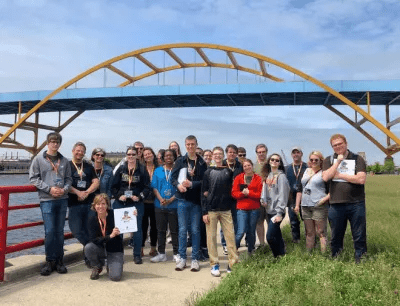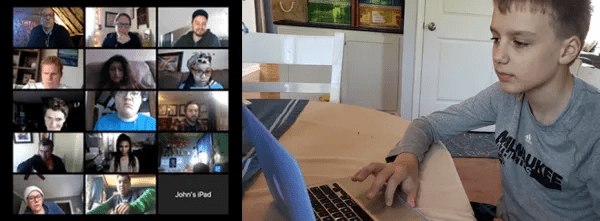
Occupational Therapy Program Helps Students With Autism Spectrum Disorder Channel Skills Into Creative Pursuits
Amy Mason is an OTR from Wisconsin who developed a unique vocational training program for young adults with autism spectrum disorders.

Amy Mason, MS, OTR/L
Director of Integrated Learning, Islands of Brilliance
Adjunct Faculty, Mt. Mary University
Location: Wisconsin
Certified in 1990
The OT Innovation
Many parents of children with autism spectrum disorder (ASD) often recognize their child’s love of creativity but do not know how to foster those efforts for future successes. Amy Mason, an OTR and Director of Integrated Learning at Islands of Brilliance (IOB), knew that occupational therapy (OT) could be a bridge to connecting dreams to reality.
IOB Digital Academy for youth and young adults with ASD uses evidence-based practices in the areas of learning, social emotional learning, and transition to equip students with the skills necessary to access post-secondary education and/or employment in design and tech-related fields. In contrast to traditional vocational training programs, IOB Digital Academy is a collection of work-based learning experiences that are centered on personal interests in art, design, and coding. Students drive their learning, consulting with professional mentors to achieve the skills that meet their participation, education, and employment goals.
“[The Digital Academy] helped me explore my skills and work on finding job opportunities. DA also helped me practice resilience and work stamina. I enjoy having the opportunity to work on creative processes to get me more inspired.”
Digital Academy Student
As an occupational therapist developing this program, Amy uses her practice lens to inform the structure of the program, which relies on the development of specific performance skills and patterns that are important to the students. She leverages her OT lens—drawing on years of experience working in traditional school settings and her deep understanding of what students living with ASD need to access through learning environments—and applies it to an innovative community-based practice program that provides experiences not available in traditional therapy settings. The Digital Academy curriculum allows participants to cultivate occupational performance skills while focusing on their own strengths and interests in gaming, coding, animation, etc. This innovative approach enables Amy and the team to customize learning experiences to the students’ own interests and skills.
“I feel like [the Digital Academy] supports me a lot – it helps me accentuate my artistic skills and wanting to have a career. It helps me adapt to situations – this will help me with any of the classes I will be taking. As an added bonus, it taught me how to have fun with the stuff that we do and have unique ideas and projects we are making.”
Digital Academy Student
The Pivot
As with all IOB programs, Digital Academy sessions were traditionally conducted in person. In March 2020, with the onset of the COVID-19 pandemic, IOB quickly pivoted to a virtual platform. The Digital Academy was the first program to go online, only two weeks after the “safer at home” orders were enacted in Wisconsin. Amy and her team immediately recognized that continued engagement was more important than ever for their students who, because of their special needs, might be feeling an even greater impact from the disruption in routine.

Nearly all of the students successfully transitioned to the distance-learning model (and new students have been added over the past few months). Although they miss coming to the studio, many students say they are more comfortable learning at home. Because they are more comfortable, the team gets a chance to interact more often and provide more individualized support. They connect with one another almost daily, which is a big switch from the in-person experiences. Additionally, barriers within the community, such as transportation and navigating difficult sensory issues, have been eliminated. The participants look forward to connecting each week and say their time together makes them feel a part of the community while they are staying safe at home.
Much of the successful transition can be attributed to Amy’s tireless dedication to her students and the program. Since March, Amy and the team have facilitated 65 Digital Academy sessions, totaling over 1,867 instructional hours among all participants.
Producing Positive Results
The Digital Academy program works toward a number of outcomes intended to enhance quality of life, including pursuit of personal aspirations, internal drive and motivation, contribution to occupation, meaningful connections, confidence, collaboration, presenting/sharing work, and inclusion (skills for working with different kinds of people).
Over the past 18 months, the most notable evidence speaks to progress in developing a sense of community and belonging as well as increased confidence. Digital Academy projects emphasize a team approach and incorporate activities that foster teamwork and connection. The early victories students have experienced in the virtual IOB community have validated Amy and her team’s core approach: meeting students where they are. The forced “pivot” to virtual learning has inspired them to keep exploring whether online environments are better for encouraging socialization and learning.
